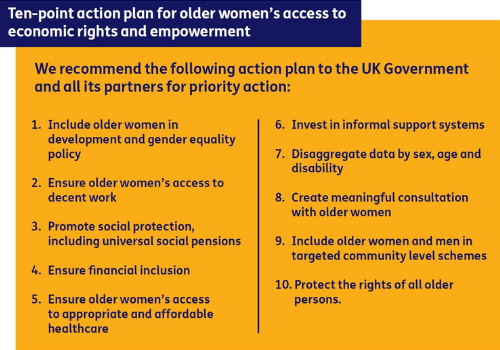Thousands sign our petition calling for equal rights for older women
Published on 01 April 2022 11:13 AM
Over 7,300 people signed our petition demanding equal rights for older women worldwide. Collectively we called on the UK Government to recognise and include the rights and needs of older women when developing its new International Development Strategy.
Each signature on the petition represents a voice saying that older women count and must be recognised. Your voices have already helped Age International to make a difference.
Together, we’ve highlighted the urgent need for the Government to address the inequalities older people experience in low and middle-income countries. Age International will be watching closely to see how the Government considers older women and men in its new International Development Strategy.
Building on the recommendations in our Older women: the hidden workforce report, the petition demanded the UK Government and Parliament recognise and include older women in its strategy for international development work. The new strategy is important in setting the focus and priorities of the Foreign Commonwealth and Development Office (FCDO) over the coming years.
Our report described how older women around the world shoulder a large proportion of unpaid and paid work, including care, for their families and communities whilst receiving little recognition, pay, pension payments or practical support. It drew on research conducted by interviewing older women living in urban and rural areas in Ethiopia and Malawi, amplifying the voices of those who are seldom consulted and outlining the barriers they face in accessing their basic economic rights.
We know that the specific experiences and contributions of older women are frequently left out of international policies and strategies, so the report calls on the UK Government and its partners to do more to recognise the challenges they face with a “ten-point action plan”. The recommended actions included ensuring older women are specifically included in development and gender equality work and aren’t excluded from research.

As well as demonstrating public interest in addressing older women’s inequality, the report and petition have provided a vital platform for us to engage with Parliament. Members of Parliament and Peers in the House of Lords have brought older people’s rights to the Government’s attention in parliamentary debates and by asking questions on how the international strategy will include the rights and needs of older people. MPs and Peers asking questions about older people’s rights helps to strengthen accountability and raise awareness by showing the Government that their colleagues are paying attention to the issue.
On paper, progress has already been made in terms of the UK Government giving more consideration to older people’s rights. For example, the FCDO’s new disability strategy, which describes how it will work with and for people with disabilities around the world, has a passage dedicated specifically to the rights and needs of older people, and we will be able to monitor their progress against the commitments made within it. This is a promising sign that the forthcoming International Development Strategy will also be more explicit with its support for older people.
Our report showed how wider goals for communities, women in all their diversity, and for all generations can only be achieved when older people are included. The International Development Strategy is expected to be published in the coming weeks and we won’t know its exact content until then, but we hope that the collective voice of our supporters has helped put the issue of older men and women’s equality firmly on the Government’s radar.
Age International will be watching closely, ready to represent the voices of older women and men and hold the Government and the Foreign Commonwealth and Development Office to account on their commitments. And we’ll keep you updated!
Older women: the hidden workforce
Globally, older women are contributing unrecognised yet critical support to their families, communities and economies through their paid and unpaid work. Our new report gives voice to older women’s experience of work and sets out recommendations for how to address this inequality.
 Follow us on social media
Follow us on social media
Check out our social media platforms for the latest updates.
